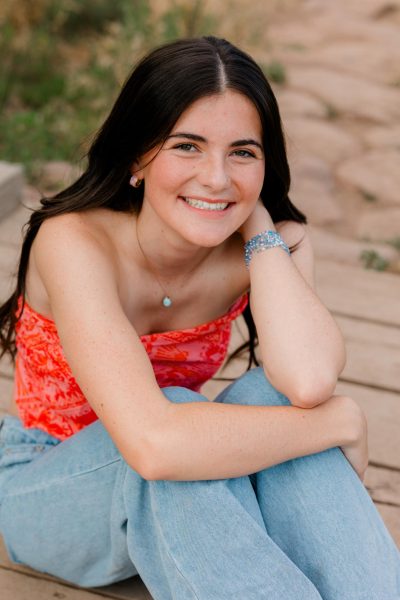With zero broadcast experience, and less than a semester of experience at Monarch, journalism advisor Ben Reed had an uphill battle ahead of him.
In the fall of 2017, Monarch received voter-approved funds to create “innovative learning spaces” in the building. Up against established programs, Reed, along with language arts teachers Bonnie Katzive and Mike Kugler, proposed a hub for three journalism classes (Broadcast, Newspaper, and Yearbook) as well as video production classes. When the proposal was approved, an old computer lab in room A208 was converted into the modern-day Hub.
KYOT was well on its way to taking to the airwaves. However, there was one major problem.
“I had no idea how to teach broadcasting at all,” Reed said. “I had no idea how the software even worked.”
As expected, the first year of the broadcast program was far from smooth.
“I had more nightmares that year than I’ve had in my life,” Reed said. In Broadcast Journalism’s first year, the class was combined with the Newspaper class. That meant there were 45 kids—25 from Broadcast and 20 from Newspaper—in the same room during the third period.
Since its creation, the broadcast program was chaotic. Only one of the four producers had experience with the software required to create a production, and that experience was minimal. The only training the other leaders had was a two-day camp over the summer to learn the bare bones of broadcast journalism.
“I lied to get the job,” one of KYOT’s first producers, Lincoln Roch, said. “I had said like, ‘Yeah, I have some experience with Premiere Pro.’ Never once touched the software.”
Trying to train the staff members was a difficult task because of how little the producers knew. Even among those who were supposed to be the leaders, there was constant fighting.
“Me and my co-producers were like a married couple yelling at each other in front of the staff,” Roch said. “My co-producer was one of the anchors, but this other anchor wouldn’t do anything and just loved drama, and the chemistry there was terrible. So we fired her and replaced her.”
Although the behind-the-scenes work was chaotic, an episode was produced every week without fail. And eventually, the group started to figure out what they were doing.
“By March, we were getting the hang of things,” Roch said. The staff members and producers had learned what it took to produce a newscast.
But that was when that everything stopped.
It was March of 2020, and the Covid pandemic hit.
“For the rest of that semester, we kind of gave in,” Reed said. “But in the fall of 2020, we were all at home and we wanted to keep it going. The community wanted it. They wanted something to rally people and unify our community.”
For a semester, the group found a way to produce an episode every week despite being trapped inside their own homes.
“I had to drive and meet Mr. Reed to pick up equipment every week. The Hub became his house,” Roch said.
Due to the way the schedule worked with online learning, Broadcast Journalism was only a semester long. That meant the students had to figure out a way to keep KYOT on the air for another half of a year.
“We had to keep it going, so we met as a club,” Reed said. “It started with like ten people in the club, but eventually it was maybe three.”
Still, they managed to come out with an episode every week.
“It was a complete nightmare, but also the most fun I had at Monarch,” Roch said.
The struggle was worth it. KYOT has improved every year, and now they are incredibly successful.
This year, the current executive producer Macey Austin and producer Dominic Spacone were finalists for the National Scholastic Press Association’s sports story of the year. Every year since the first, KYOT has won the All-Colorado Award from the Colorado Student Media Association, the equivalent to a state championship in broadcast journalism.
“I like what it looks like, and I care about it,” Austin said. “There is a massive amount of dedication and work put into each episode, but the group genuinely enjoys it.”
Beyond the awards and recognition, the staff loves the class and has fun with what they do.
“This class is something that I enjoy, and I’m really passionate about it,” Austin said. “I put time into other classes, but I put time into this one because I like it and I want everyone to do well.”
Many things have stuck with KYOT since that first year. The iconic introduction song, called “Our Song,” by The Frenchies, still plays every Tuesday and has remained the same every single year. The classic ‘Wake up, Monarch!’ heard at the beginning of every episode has been the introduction every year since the start.
Although there are aspects of the show that have stayed consistent, plenty has changed behind the scenes.
“We’ve revised our team bonding with Friday Fun Day and our snacks on block day,” Austin said.
An emphasis on team bonding, a sense of play and experimentation, and trust has played a big part in their success and growth.
In addition to team bonding, Reed learned that for the program to run smoothly, there needed to be clearly defined roles between all staff members.
“The first year, the boss of KYOT was also the editor-in-chief of Newspaper, who knew nothing about broadcasting, which was a crazy and horrible idea of mine,” Reed said. “Now we have a clear hierarchy, with Macey Austin being the executive producer, a team of producers under her, and the staffers underneath there.”
Things on-screen have changed, too. This year, a new segment known as “I’m Mad with Dominic Spacone” has been added to the show. Every week, Spacone talks about something new that he is upset about.
This follows in the footsteps of Sportsball, a segment from the very first year that was resurrected last year. “It was gone until last year when Tyler Rock came in and said he wanted to do it,” Reed said. “And he did, he brought it back.”
Throughout the struggles, changes, and growth that KYOT has undergone, the production has continued to inform and entertain Monarch High School.
“I want people to enjoy KYOT enough that they want to return and build on everything we have done for the past five years,” Austin said.
KYOT creation
Broadcast journalism program rises to the top
Lincoln Roch films anchors Jordan Jensen and Carson Benish for the first episode of KYOT on Sept. 27, 2019.
March 14, 2024
0
About the Contributors

David Maxwell, Art Director

Zoey Perrine, Editor in Chief

Brianna Sandoval, Social Media Editor

Dillon Lewis, Staff Writer































